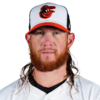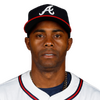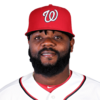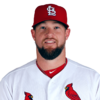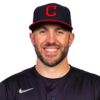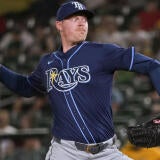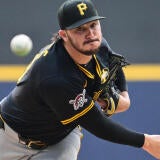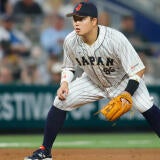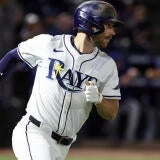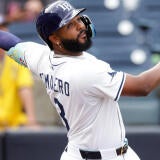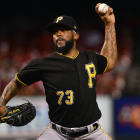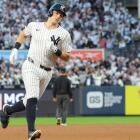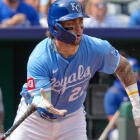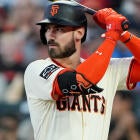Fantasy Baseball Bullpen Report: Tiering closers — who can you really trust?
There's a difference in the way managers have approached the ninth inning this season, and it's forcing our Scott White to reconsider the way he approaches closers.
More Fantasy Baseball: Waiver Wire | Juan Soto's same-side dominance
It had to happen eventually.
As rapidly as the game has changed in other areas over the past few years, from lineup construction to infield shifts to escalating strike rates to a newfound appreciation for the fly ball, it seemed like only a matter of time before the most widely scrutinized practice of all went belly-up.
- Subscribe to the Fantasy Baseball Today podcast for free on Apple Podcasts, Stitcher, TuneIn, Google Play or anywhere else you listen.
So here we are: 2018, the first year in which the fixed closer is no longer a fixture.
As we near the season's midway point, I couldn't tell you who the Astros or Phillies, two honest-to-goodness contenders, will turn to for their next save chance, and that has been true for each more or less all year. The Angels have only recently shown a preference for Blake Parker and the White Sox for Joakim Soria. A poor outing for either could send his manager's eyes a-wandering. Meanwhile, the Rays still have yet to settle on a closer after trading Alex Colome to the Mariners, but seeing as they've turned traditional bullpen usage completely on its head, often beginning the game with a short reliever on the hill, I doubt it's much of a priority for them.
And that's just the tip of the iceberg. At different points this season, the Blue Jays, Brewers, Braves, Cardinals, Orioles, Padres, Rangers have at least flirted with the idea of having more than one reliever fill ninth-inning duties. When that many teams invite uncertainty to a role that's already known for its volatility, the next big saves source becomes sort of a moving target, keeping Fantasy owners a step behind at a position where role is everything.
It's a little like when backfield committees started to spring up all over the NFL. Once you can no longer count on the player at the top of the depth chart to serve as the bell cow, the few throwbacks who do command a premium in drafts and trades.
We're not quite there yet for saves, but with two of the brainiest organizations at the forefront and copycats lurking, the movement is beginning, to the cheers of countless number crunchers who have long argued that a game's most pivotal moment isn't always the ninth inning.
It shouldn't concern you so much as an owner of Craig Kimbrel, Wade Davis or anyone else who is genuinely entrenched in the role. But with guys like Hunter Strickland and Kelvin Herrera, who have been just as certain of handling their teams' save chances to this point but have clear impediments to their longevity in the role, it has to change your approach. While in the past, one pitcher losing save chances meant another would inherit them, now there's a reasonable chance a committee could spring up in his place.
Bottom line is that in this year more than any other, I care who my closer is. I don't care as much as I care who my third baseman or SP2 is, but I care. What I had long approached as more or less just a giant tier of saves-getters, with varying degrees of dominance therein, I now see as three distinct tiers.
And if I have one of the top-tier guys, I may not be so willing to give him up — not even for a better third baseman or SP2.
| 1 |
Craig Kimbrel
Boston Red Sox RP
|
| 2 |
Aroldis Chapman
New York Yankees RP
|
| 3 |
Edwin Diaz
Seattle Mariners RP
|
| 4 |
Kenley Jansen
Los Angeles Dodgers RP
|
| 5 |
Sean Doolittle
Washington Nationals RP
|
| 6 |
Brad Hand
San Diego Padres RP
|
| 7 |
Wade Davis
Colorado Rockies RP
|
| 8 |
Corey Knebel
Milwaukee Brewers RP
|
| 9 |
Brandon Morrow
Chicago Cubs RP
|
| 10 |
Blake Treinen
Oakland Athletics RP
|
Yup, we can pretty much all agree who the great closers are. Some might question what kind of leash Kenley Jansen has after his poor start to the season, but while his numbers haven't recovered to their usual standard, a 2.64 ERA and 0.98 WHIP with more than a strikeout per inning is still objectively good.
Others you might second-guess include Brad Hand, Corey Knebel and Blake Treinen. Hand pitches for a miserable team but is one of the most overpowering relievers in baseball and has had no trouble piling up saves so far. Knebel quickly reclaimed ninth-inning duties after returning from the DL, even with Josh Hader's continued dominance, and is bolstered by last year's numbers. As for Treinen, all I can say if you don't think he belongs is that you obviously haven't been paying attention.
| 1 |
Brad Boxberger
Arizona Diamondbacks RP
|
| 2 |
Raisel Iglesias
Cincinnati Reds RP
|
| 3 |
Jeurys Familia
New York Mets RP
|
| 4 |
Felipe Vazquez
Pittsburgh Pirates RP
|
| 5 | 
Cody Allen
Cleveland Indians RP
|
| 6 | 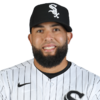
Kelvin Herrera
Kansas City Royals RP
|
| 7 | 
Arodys Vizcaino
Atlanta Braves RP
|
| 8 |
Fernando Rodney
Minnesota Twins RP
|
| 9 |
Keone Kela
Texas Rangers RP
|
| 10 |
Hunter Strickland
San Francisco Giants RP
|
Part of the beauty of tiers is that everyone brings their own instincts, biases and assumptions to them, so they're never going to look exactly the same for two different people — or from one day to the next. So if you want to second-guess what I've done here, well, I'm right there with you.
Say Raisel Iglesias reels off four saves over the next week, for instance. I'm going to feel kind of silly for leaving him out of the first group since, in terms of ratios, he clearly belongs. My feeling now, though, is that the Reds are so bad -- and a particular kind of bad that makes them less likely to win low-scoring games -- that he won't deliver a competitive saves total. And because they're so bad, he's likely on the move at the trade deadline anyway, probably to become a setup man elsewhere.
Felipe Vazquez and Cody Allen seem to have long leashes and have performed like high-end closers in the past, but they've been so unreliable this year that you can't just assume everything's hunky-dory with them. Meanwhile, Kelvin Herrera is sure to be traded at some point, Arodys Vizcaino isn't the best reliever on his own team, and Hunter Strickland is looking over his shoulder at a more expensive reliever who's far more established as a closer and appears to be back to full health.
| 1 |
Bud Norris
St. Louis Cardinals RP
|
| 2 |
Zach Britton
Baltimore Orioles RP
|
| 3 |
Kyle Barraclough
Miami Marlins RP
|
| 4 |
Blake Parker
Los Angeles Angels RP
|
| 5 |
Ken Giles
Houston Astros RP
|
| 6 |
Shane Greene
Detroit Tigers RP
|
| 7 |
Seranthony Dominguez
Philadelphia Phillies RP
|
| 8 |
Ryan Tepera
Toronto Blue Jays RP
|
| 9 |
Joakim Soria
Chicago White Sox RP
|
| 10 |
Sergio Romo
Tampa Bay Rays RP
|
Bud Norris only recently dropped to this tier, both because of his own inconsistencies and the newfound strikeout ability for Jordan Hicks, the man with the 103-mph fastball. Beyond him, there are pitches who are still trying to reclaim the closer role (Zach Britton, Ken Giles), pitchers who are re-acclimating to it (Kyle Barraclough, Blake Parker) and pitchers who we just don't think are particularly good (Shane Greene, Ryan Tepera, Joakim Soria and Sergio Romo).
And then there's Seranthony Dominguez, who by all recent indications is especially good. He's an odd case, being the one guy in these three tiers who we have good reason to believe isn't the Phillies' first choice for saves. But because it looks like a true committee and because there isn't a clear standout apart from him and because manager Gabe Kapler has already shown a willingness to let him finish a game from whatever point he enters, I suspect he'll end up leading the Phillies in saves, even if it's with fewer than 20.

